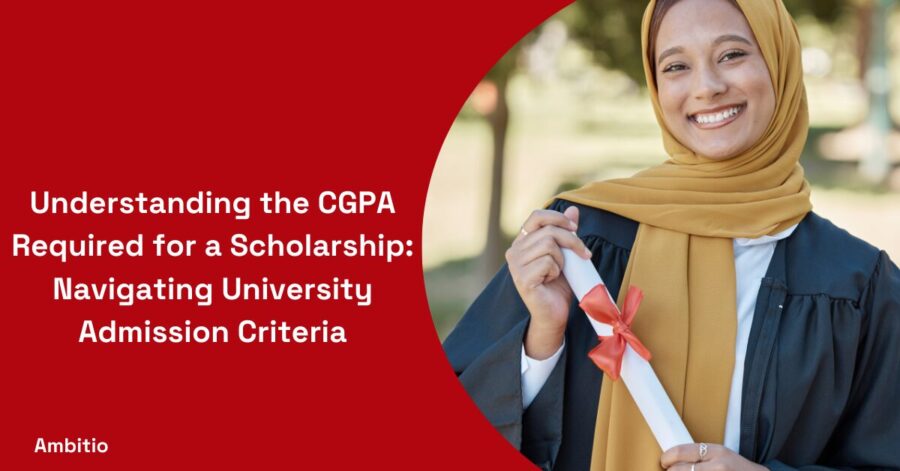13 December 2024
7 minutes read
Understanding the CGPA Required for a Scholarship: Navigating University Admission Criteria

Introduction
Navigating the world of scholarships can be daunting, especially when understanding the importance of your CGPA (Cumulative Grade Point Average). This comprehensive guide aims to shed light on the CGPA requirements for scholarships and how they impact your university admission process.
Understanding the Role of CGPA in Scholarship Applications
CGPA plays a pivotal role in scholarship applications. It’s not just a number but a reflection of your academic journey. This section will explore how universities view CGPA and why it’s a crucial factor in scholarship considerations.
The Significance of CGPA in Academic Assessment
Your CGPA is often the first aspect of your academic profile that scholarship committees examine. It provides a quick, albeit partial, snapshot of your academic consistency and prowess.
Universities use CGPA as a benchmark to assess a student’s capability to handle challenging coursework, which is essential for maintaining the academic standards they aspire to uphold. The CGPA threshold varies between institutions and scholarship programs but generally ranges from 3.0 to 3.5 on a 4.0 scale.
How Different Universities View CGPA
Different universities have varying perspectives on CGPA. While some might strictly adhere to the minimum CGPA requirement, others might adopt a more holistic approach.
For example, Ivy League and other top-tier universities often expect higher GPAs due to the competitive nature of their programs. However, many state universities and colleges may offer flexibility, especially if the student demonstrates strength in other areas like leadership or community service.
The Minimum CGPA: A Critical Criterion for Scholarship Eligibility
This section delves into the specifics of minimum CGPA requirements across various scholarships and how they impact your eligibility.
Understanding Minimum GPA Requirements
The minimum CGPA requirement is a filter used by scholarship committees to manage the large pool of applications. However, meeting the minimum CGPA doesn’t guarantee a scholarship; it merely gets your foot in the door.
Some scholarships set their minimum requirement at a 3.0 CGPA, while others, especially those that are more prestigious or specialized, may demand a CGPA of 3.5 or higher.
The Range of CGPA Requirements
It’s crucial to understand that CGPA requirements can vary widely. For instance, scholarships aimed at supporting students in financial need might prioritize other aspects over a high CGPA. In contrast, merit-based scholarships, which reward academic excellence, will have stringent CGPA requirements. Additionally, scholarships focused on specific fields like engineering or science might have different GPA expectations than those in the arts or humanities.
Beyond the Numbers: Other Factors in Scholarship Applications
While CGPA is a significant criterion, it’s not the only factor in scholarship applications. This section explores other essential elements that can influence your scholarship prospects.
The Holistic Approach to Scholarship Selection
Many scholarship committees adopt a holistic approach to evaluating applications. They consider various factors like leadership roles, community service, extracurricular activities, personal essays, and letters of recommendation. These components allow students to showcase their unique qualities and strengths beyond academic performance.
Balancing a Lower CGPA with a Strong Application
For students who may not meet the high CGPA standards, focusing on other aspects of the application is crucial. Engaging in community service, excelling in leadership roles, and demonstrating unique talents can significantly enhance your application. A well-crafted personal statement that tells your story, highlights your achievements and explains any academic shortcomings can also be influential.
Strategies to Improve Your Scholarship Application
Improving your scholarship application requires a multi-faceted approach. This section offers strategies to enhance both your CGPA and other critical aspects of your application.
Tips for Boosting Your CGPA
Improving your CGPA is a gradual process. It involves consistent effort, seeking help when needed, and focusing on areas of improvement. Regularly meeting with academic advisors, utilizing tutoring services, and forming study groups are practical ways to enhance your academic performance. Additionally, selecting courses wisely—balancing challenging subjects with those in which you excel—can also positively impact your CGPA.
Enhancing Your Overall Scholarship Profile
Apart from academic excellence, developing a comprehensive profile is key. Participating in extracurricular activities, pursuing internships, and engaging in community service projects can greatly enhance your application. These experiences not only provide a well-rounded profile but also equip you with skills and insights that are highly valued by scholarship committees.
Preparing for the Future: Long-Term Strategies for Scholarship Success
Securing a scholarship is not just about meeting current requirements but also about long-term planning and preparation. This section provides insights into strategies that can increase your chances of scholarship success over time.
Developing a Long-Term Academic Plan
Creating a long-term academic plan can help in steadily improving your CGPA and maintaining a strong academic record. This involves setting realistic goals each semester, seeking academic counseling, and being proactive in addressing any academic weaknesses.
Building a Comprehensive Profile Over Time
A well-rounded profile is built over time. Engaging in diverse activities, developing leadership skills, and participating in community projects from early on in your academic journey can significantly enhance your scholarship prospects. Documenting these experiences and reflecting on the skills and insights gained from them is also crucial in preparing a compelling scholarship application.
International Students and GPA Requirements
For international students, understanding GPA requirements and how they translate to the grading system in the country of their chosen university is vital. This section covers the challenges and solutions for international applicants.
Navigating Different Grading Systems
The grading system in your home country might differ significantly from the 4.0 scale used in countries like the USA and the UK. International students must be aware of how their grades convert to this scale. Many universities provide GPA conversion charts, or students can use online conversion tools to estimate their GPA equivalency.
Meeting GPA Requirements as an International Student
International students often face the challenge of meeting the GPA requirements set by foreign universities. It’s essential to research and understand these requirements well in advance.
Preparing a strong application that highlights your academic achievements, along with other talents and experiences, is key. Additionally, some universities offer conditional acceptance based on improving your GPA in the first semester or year of study.
Unique Scholarship Opportunities and Alternative Paths
When it comes to scholarships, there’s a world of opportunities beyond the traditional academic performance-based awards. These unique scholarships and alternative paths cater to a diverse range of talents, interests, and backgrounds, providing avenues for students who may not have the highest CGPAs but possess other remarkable qualities or experiences. Here’s an expanded look at some of these opportunities:
- Community Service Scholarships:
- Criteria: Focus on volunteer work and community involvement.
- Benefits: Recognizes and rewards those who have made significant contributions to their communities.
- Examples: Scholarships from local nonprofits or community organizations often prioritize community service over academic performance.
- Leadership Scholarships:
- Criteria: Emphasis on demonstrated leadership skills in school or community settings.
- Benefits: Ideal for students who have held positions in student organizations, community groups, or local initiatives.
- Examples: Awards from civic groups or leadership foundations that seek to nurture future leaders.
- Athletic Scholarships:
- Criteria: Based on sporting prowess and achievements in specific sports.
- Benefits: Offers opportunities for students who excel in athletics to gain financial support for their education.
- Examples: Scholarships from sports associations, universities with strong athletic programs, or sponsors associated with sports.
- Artistic and Creative Scholarships:
- Criteria: Talent in areas such as visual arts, music, dance, theater, or creative writing.
- Benefits: Supports students with exceptional creative talents and provides a platform for their artistic pursuits.
- Examples: Awards from art institutes, cultural organizations, or foundations dedicated to the arts.
- Career-Specific Scholarships:
- Criteria: Intended for students pursuing careers in specific fields like nursing, engineering, or teaching.
- Benefits: Supports students in specialized programs, often with the expectation of entering a particular career field upon graduation.
- Examples: Professional associations or corporations offering scholarships to students in relevant fields.
- Scholarships for Underrepresented Groups:
- Criteria: Aimed at supporting students from minority groups, including ethnic, racial, or other underrepresented communities.
- Benefits: Promotes diversity and inclusion in higher education.
- Examples: Scholarships from cultural organizations, advocacy groups, or foundations focused on equal opportunities.
- Entrepreneurial Scholarships:
- Criteria: For students who have started a business or have a solid plan for an entrepreneurial venture.
- Benefits: Encourages and supports young entrepreneurs, fostering business skills and innovation.
- Examples: Awards from business incubators, corporate sponsors, or entrepreneurship foundations.
- Scholarships Based on Personal Challenges:
- Criteria: Designed for students who have overcome significant personal obstacles or hardships.
- Benefits: Recognizes resilience and determination in the face of challenges.
- Examples: Foundations or organizations that support students who have faced health, financial, or social adversities.
- Essay or Project-Based Scholarships:
- Criteria: Submission of an essay, research project, or creative work on a specified topic.
- Benefits: Allows students to showcase their writing, research, or creative skills.
- Examples: Competitions or awards sponsored by educational organizations, magazines, or foundations.
- Unusual Talent or Hobby Scholarships:
- Criteria: Unique talents, hobbies, or traits, often in niche or quirky areas.
- Benefits: Recognizes and rewards unusual or rare skills and interests.
- Examples: Scholarships for unique talents like left-handedness, ability in esoteric arts, or even for hobbies like knitting.
- Local Business or Community Group Scholarships:
- Criteria: Vary widely, often reflecting the interests or values of the sponsoring organization.
- Benefits: Provides community-based support, often with less competition than national scholarships.
- Examples: Awards from local businesses, rotary clubs, or small community foundations.
- Internship and Study Abroad Scholarships:
- Criteria: Participation in specific internship programs or study abroad opportunities.
- Benefits: Supports experiential learning and global education experiences.
- Examples: Scholarships from educational institutions or international organizations promoting cross-cultural exchanges.
By exploring these unique scholarship opportunities and alternative paths, students can find avenues to financial support that align with their individual strengths, experiences, and aspirations.
These options emphasize the diverse ways in which students can be recognized and rewarded, transcending the traditional focus on academic performance alone.
Conclusion: A Balanced Approach to Scholarship Success
Achieving scholarship success requires a balanced approach. While a high CGPA can significantly enhance your application, it’s essential to develop a comprehensive profile that showcases your abilities, character, and aspirations. Persistence, thorough preparation, and a strategic approach are key to navigating the scholarship application process successfully.
FAQs
What is the typical minimum CGPA required for a scholarship?
The typical minimum CGPA requirement for scholarships varies but is often around 3.0 on a 4.0 scale. For more competitive scholarships, a higher CGPA may be required.
Can extracurricular activities compensate for a lower CGPA in scholarship applications?
Yes, a strong profile with extracurricular activities, volunteer work, and excellent letters of recommendation can compensate for a lower CGPA in many cases.
Do all scholarships require a minimum CGPA?
While many scholarships have a CGPA requirement, some focus more on other criteria like community service, leadership qualities, or specific talents.
How can international students calculate their GPA for scholarship applications?
International students should use a GPA conversion tool or seek guidance from the admissions office of the university they’re applying to, to understand how their grades translate to the 4.0 GPA scale.
Is it possible to get a scholarship with a CGPA lower than 3.0?
It is possible, though options might be limited. Some scholarships consider a holistic view of the applicant, focusing on other strengths and achievements.

You can study at top universities worldwide!
Get expert tips and tricks to get into top universities with a free expert session.
Book Your Free 30-Minute Session Now! Book a call now




























